外研(新标准)版七年级下Module 10 A holiday journey Unit 2 This morning we took a walk.课件(共58张PPT)
文档属性
| 名称 | 外研(新标准)版七年级下Module 10 A holiday journey Unit 2 This morning we took a walk.课件(共58张PPT) | 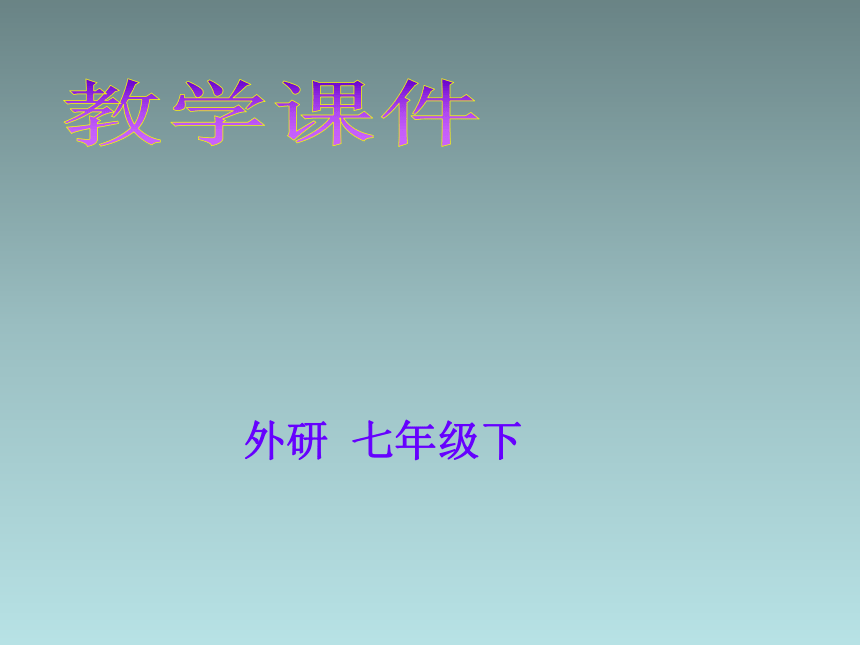 | |
| 格式 | ppt | ||
| 文件大小 | 4.5MB | ||
| 资源类型 | 教案 | ||
| 版本资源 | 外研版 | ||
| 科目 | 英语 | ||
| 更新时间 | 2022-07-10 05:59:47 | ||
图片预览

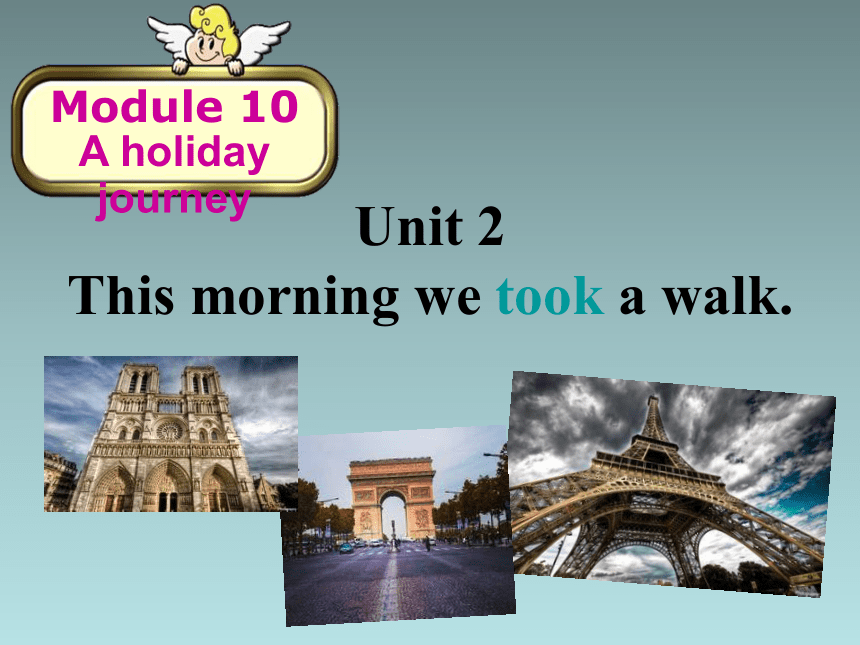
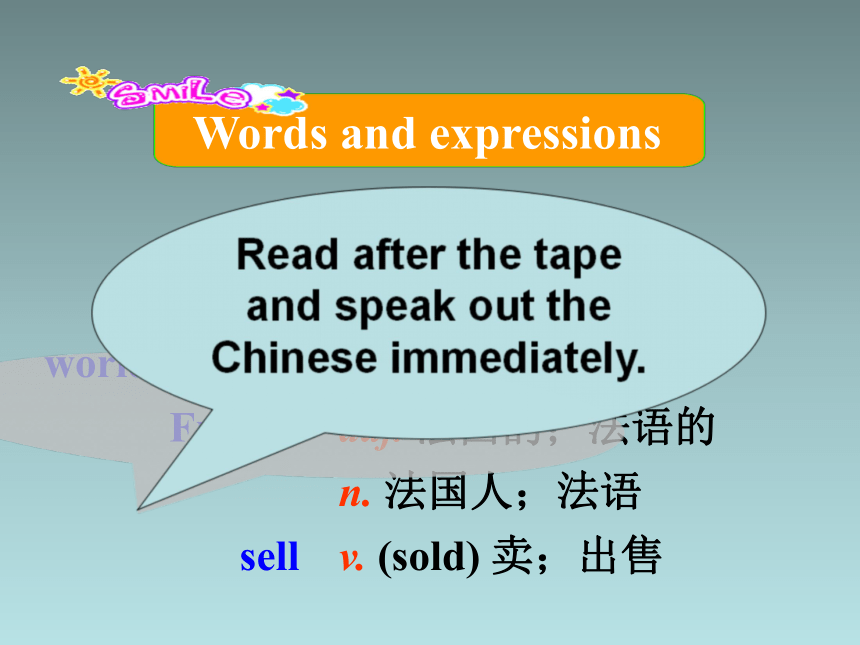

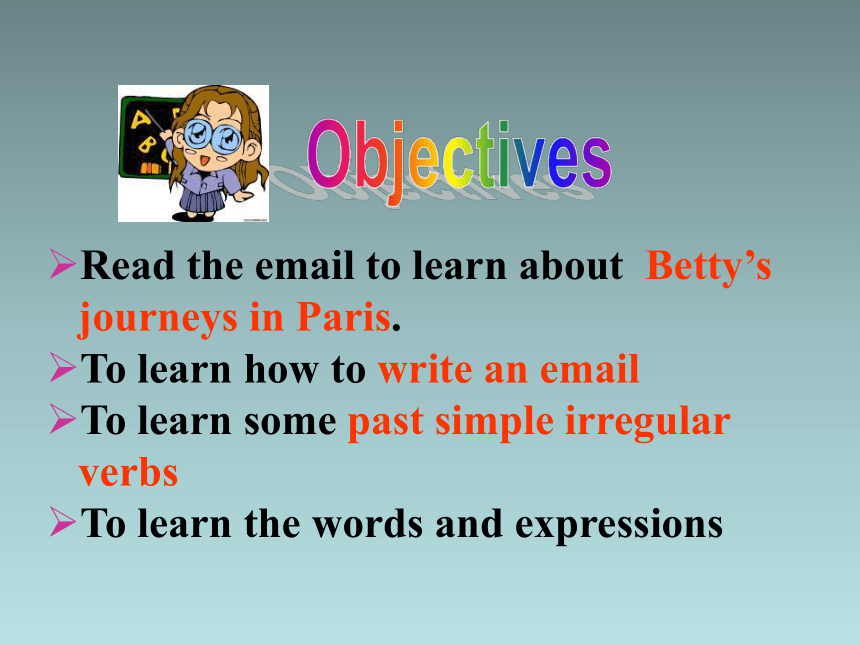
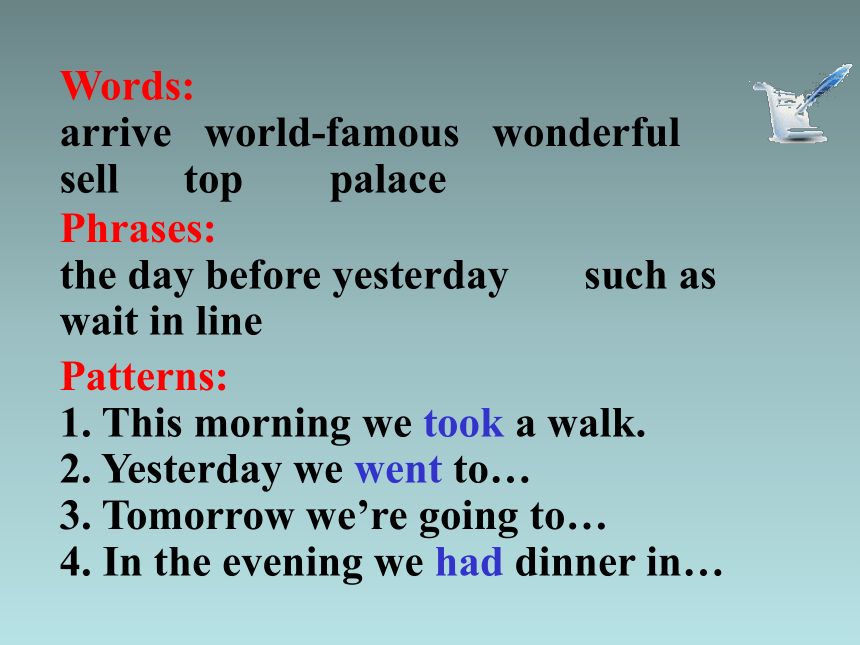
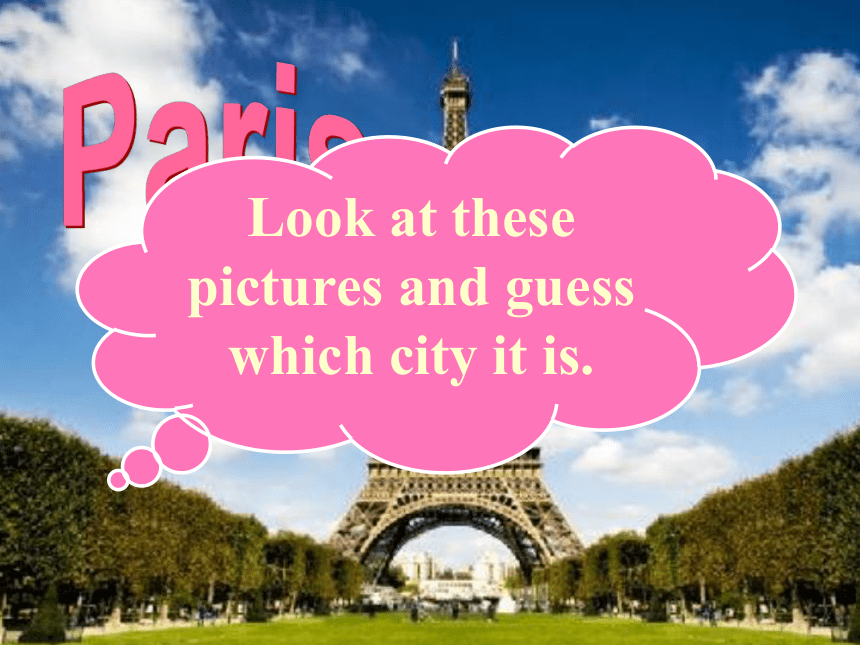
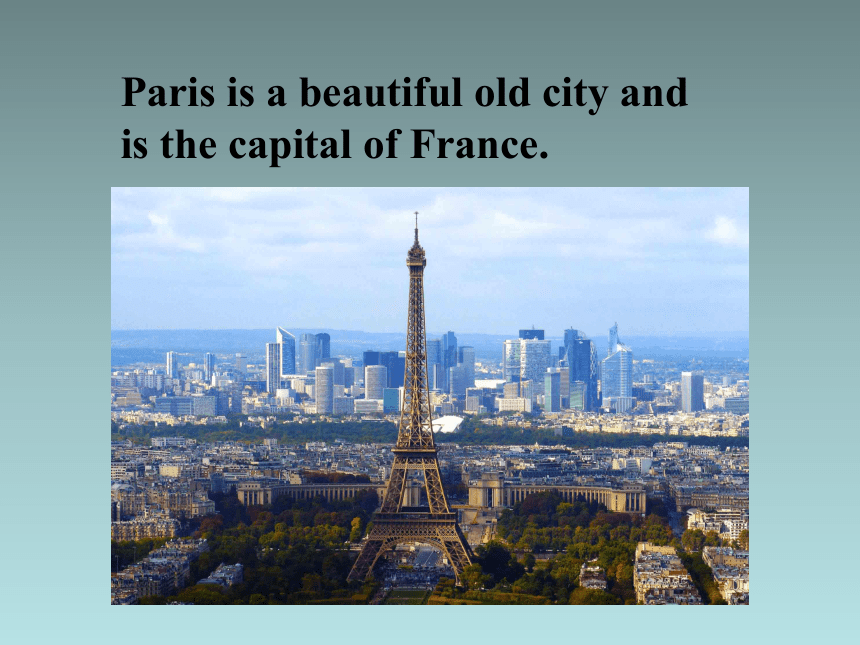

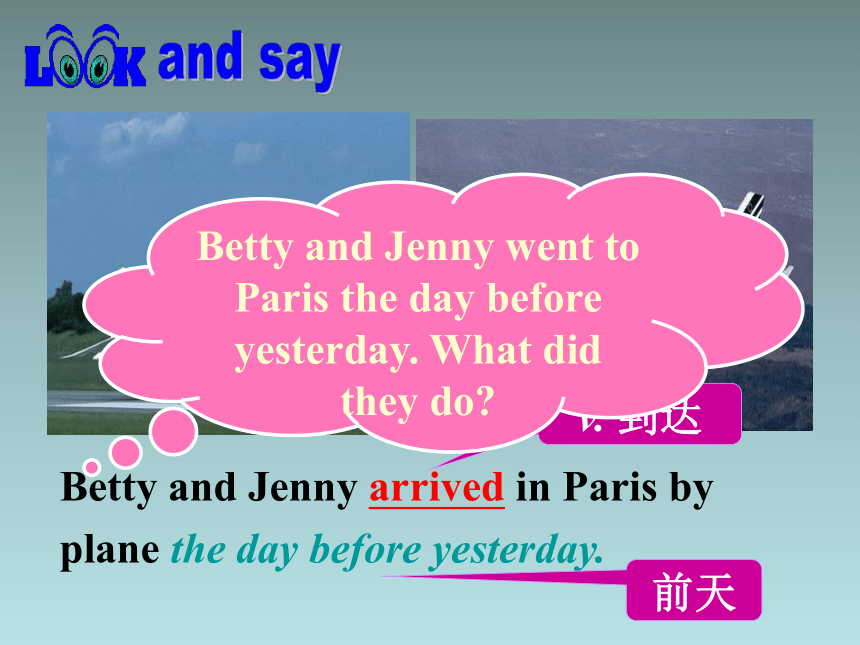
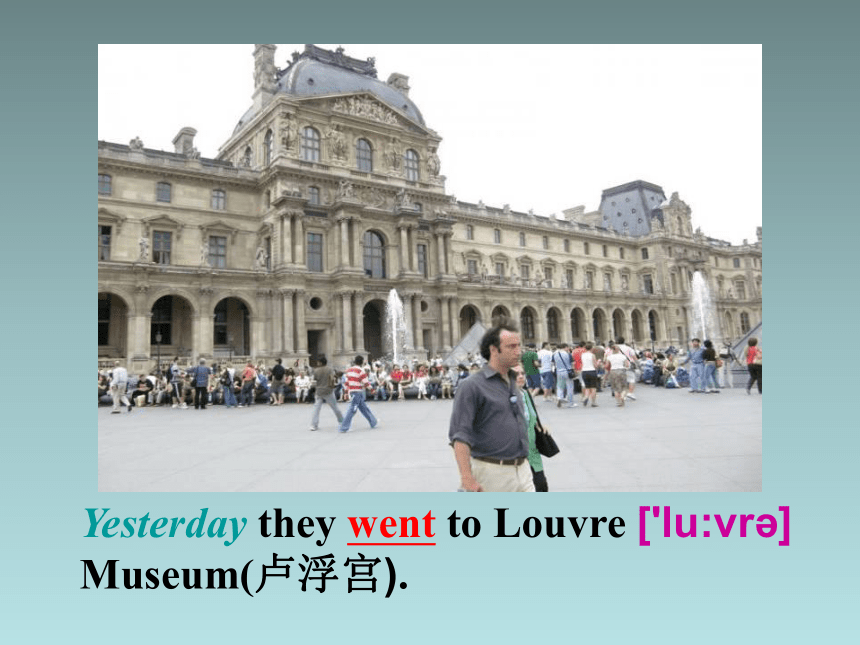
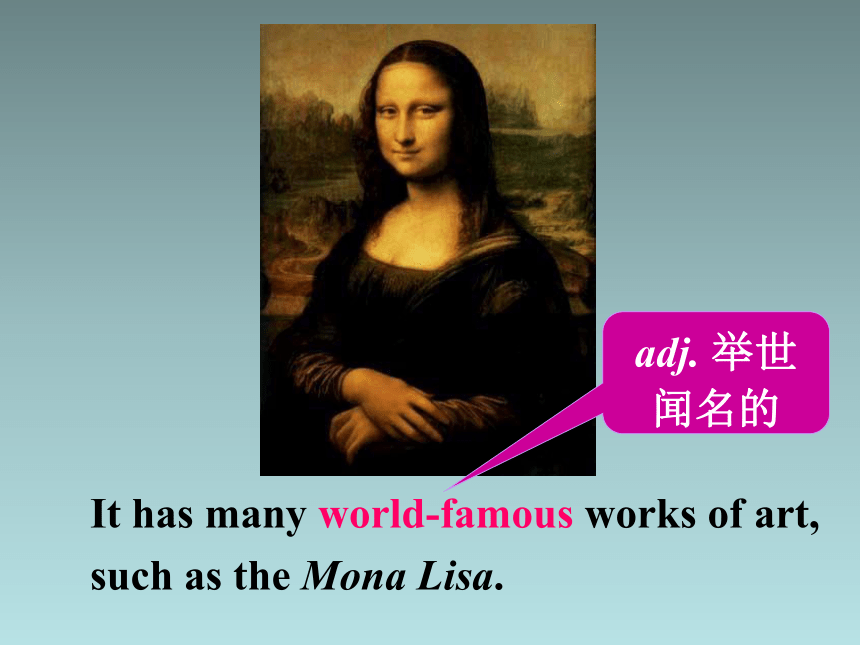
文档简介
(共58张PPT)
外研 七年级下
Unit 2
This morning we took a walk.
Module 10
A holiday journey
arrive
relax
world-famous
French
sell
v. 到达
v. 放松
adj. 举世闻名的
adj. 法国的;法语的
n. 法国人;法语
v. (sold) 卖;出售
Words and expressions
n. 顶端
conj. 直到……为止
n. 电灯
adv. 在使用中;开着的
adj. 绝妙的;了不起的
n. 宫殿
top
till
light
on
*wonderful
palace
Words and expressions
Read the email to learn about Betty’s journeys in Paris.
To learn how to write an email
To learn some past simple irregular verbs
To learn the words and expressions
Words:
arrive world-famous wonderful
sell top palace
Phrases:
the day before yesterday such as
wait in line
Patterns:
1. This morning we took a walk.
2. Yesterday we went to…
3. Tomorrow we’re going to…
4. In the evening we had dinner in…
Look at these pictures and guess which city it is.
Paris is a beautiful old city and is the capital of France.
What places of interest are there in Paris Enjoy the video to find the answer.
Betty and Jenny arrived in Paris by plane the day before yesterday.
v. 到达
Betty and Jenny went to Paris the day before yesterday. What did they do
前天
Yesterday they went to Louvre ['lu:vr ] Museum(卢浮宫).
It has many world-famous works of art, such as the Mona Lisa.
adj. 举世闻名的
The Eiffel ['a f l] Tower
It is really high. There are lots of tourists.
You can get a wonderful view from the top of the tower.
adj. 绝妙的;了不起的
n. 顶端
Tomorrow we’re going to visit a famous palace.
n. 宫殿
Betty has written an email to her grandma about her journey in Paris. Watch and listen.
Read and put the places in the correct order.
the River Seine
the street markets
the Louvre Museum
the Paris Underground
French restaurant
the Eiffel Tower
1
2
3
4
5
6
Task 1
1. Betty arrived in Paris two days ago. ( )
2. She took a tour in the city the day before yesterday. ( )
3. They saw the Mona Lisa in the Louvre Museum. ( )
Read again and check the true sentences.
Task 2
√
×
yesterday.
√
4. They had dinner in a Chinese restaurant in the evening. ( )
5. They took the Paris Underground today.
( )
6. They waited for three hours to go to the top of the Eiffel Tower. ( )
7. Tomorrow they are going to take a boat tour on the River Seine. ( )
×
French
√
×
an hour
√
1
2
3
4
5
6
7
Complete the diary with notes. (P 63)
The day before yesterday arrived by plane
was tired
relaxed at home
Yesterday
went to the Louvre Museum
had dinner in a French restaurant
2
Task 3
This morning
This afternoon and evening
Tomorrow visit a famous palace
take a boat tour on the River Seine
took a walk
did some shopping
bought a present
went to the Eiffel Tower
1. Where did Betty go
She went to Paris.
2. Who met Betty at the airport
Her aunt and uncle met her at the airport.
3. Why did they begin their tour of the city
yesterday
Because they were tired when they arrived
the day before yesterday.
Read the email and answer the questions.
Task 4
4. Where did she go this morning
She went to the shops and street markets.
5. What does the street markets sell
They sell such good fruit and vegetables.
6. When did they go to the Eiffel Tower
They went to the Eiffel Tower at about
three o’clock.
7. How did they get to the Eiffel Tower
They went there by underground.
1
2
3
4
5
6&7
Find out the past simple irregular verbs in the passage.
And then write the base forms of them.
Task 5
Past simple irregular verbs:
met — had —
were — took —
was — bought —
began — went —
did —
meet
have
are
take
is
buy
begin
go
do
Complete the passage with the correct form of the words from the box. (P 63)
arrive, date, French, relax, till, top
The ____ today is 1st June. We _______ in the _______ capital, Paris, on 30th May, and we’re going to stay ___ 3rd June. On 30th May we were tired so we _______. But on 31st May we went to the Louvre Museum and had dinner in a restaurant. And today we went to the street markets. We also went to the ____ of the Eiffel Tower.
date
arrived
French
till
relaxed
top
4
Task 6
We’re on holiday in Paris. After we _______, Aunt Joan and Uncle Pete____ (meet) us at the airport. We ____ (go) to the Louvre Museum yesterday. And we ____(have) dinner in a French restaurant in the evening. This morning, we _____ (take) a walk and I ______ (buy) a present. Then we _____ (take) the Paris Underground to the Eiffel Tower in the afternoon. In order to go to the top of the Eiffel Tower, we ______ (wait) till all the lights _____ (be) on. We’re going to ______________ on the River Seine tomorrow.
Fill in the blanks to retell the email.
met
went
had
took
bought
took
waited
were
arrived
take a boat tour
Task 7
Try to translate the following phrases.
1. 比如
2. 首先
3. 街市
4. 乘飞机
5. 散步
6. 排队等候
7. 在机场
8. 乘地铁
9. 乘船旅游
10. 前天
11. 买东西,购物
12. 举世闻名的艺术作品
such as
first of all
street markets
by plane
take a walk
wait in line
at the airport
take the underground
take a boat tour
the day before yesterday
do some shopping
world-famous works of art
Task 8
正文格式可以是缩进式,即每一自然段开头向后缩进四个字母;但更为常见的是齐头式,即每一段从左边开始,每行取齐。
称呼:电子邮件中的称呼可不必特别正式。可像信函中那样,称呼“Dear Grandma”,也可像口语中一样,直接称呼“Hi, Grandma” 。
主题(Subject) 框的内容应简明地概括信的内容,短的可以是一个单词或短语,长的也可以是个句子,但长度不宜过长。
结束语和签名: 电子邮件的结束语和签名与信件有所不同,一般是左对齐排列。但所用语句与书信相同。
How to write an email
From
To
Subject
Attachment
Text
The main structure of an email
Closing Signature
Language points
1. Jenny and I arrived by plane the day before yesterday.
我和珍妮前天坐飞机到的。
arrive为不及物动词,后接大地方(城市,国家等)需加介词in,接小地方(车站,机场等)需加介词at,此时可与get to互换。例如:
They will arrive in New York at noon.
We arrived at the station five minutes late.
2. It has many world-famous works of art,
such as the Mona Lisa.
那里有很多世界闻名的艺术品,譬如
《蒙娜 丽莎》。
“work”此处意为“作品”,是可数名词
work of art 艺术品
那个蛋糕简直就是一件艺术品!
That cake is a real work of art!
Practise
(2) 句中的“such as”表示“例如”,用来举例,要用在句子当中,不能单独使用。
Tourists like to visit historic places in China, such as Beijing and Xi’an.
外国游客喜欢参观中国那些历史悠久的地方,例如北京和西安。
3. They sell such good fruit and vegetables.
那儿卖的水果蔬菜非常好。
sell作动词,意为“卖”,其过去式为sold。常用sell sb. sth. 或sell sth. to sb. 表示“卖给某人某物”。
Little Mary wanted to sell Little Tommy an eraser.
= Little Mary wanted to sell an eraser to Little Tommy.
在邮局排着队等可不是什么好玩的事情。
It’s not very exciting to wait in line at the post office.
4. We had to wait in line for an hour.
我们不得不排了一个小时的队。
wait in line 排队等候
Practise
5. Tomorrow we’re going to visit a famous palace… I’ll write again.
明天我们将去参观一个著名的宫殿。我会再写信给你。
I am going to visit Beijing next month.
下个月我要去北京。
When will the meeting be held
会议什么时候举行?
句中be going to do sth 和 will do sth 都可以用来表示将来时。例如:
Look at the pictures. Write sentences about Daming and Lingling’s holiday. (P63)
5
On Tuesday, they visited a museum.
On Wednesday, they went for a walk in the countryside.
On Thursday, they had lunch in a café.
Possible answers:
看图表达步骤
一、审图:
确定基本要素: 5W1H
when
who
where
why
how
what
Last summer, Two years ago, At the age of 12…
Beijing, Hangzhou, Quzhou…
Daming, Lingling
for the holiday
go … by train
认真看图, 然后在每幅图的下方写出所发生事情的相应词汇。
visit … museum
go to … park
have lunch
二. 扩展成句
把要点变成完整的句子。
On Tuesday, they visited … museum.
On Wednesday, they went to … park.
On Thursday, they had lunch in a café.
三. 连句成文
发挥想象,开好头。注意5W1H
Last summer,
Daming and Lingling
went to Beijing
for their holiday
They went by train.
On Tuesday, they visited … museum.
On Wednesday, they went to … park.
On Thursday, they had lunch in a café.
when
who
where
why
how
what
Daming and Lingling went to Beijing for their holiday.
They went boating and saw a lot of fish in the lake.
Last summer, Daming and Lingling went to Beijing for their holiday. They went by train.
They arrived on Monday.
On Tuesday, they visited … museum.
On Wednesday, they went to … park.
On Thursday, they had lunch in a cafe.
It took them…to get there.
They did some ... First,
they did a lot of shopping. They bought presents for their families. Then
四. 适当发挥
and took a taxi to their hotel.
Then they …
∧
∧
五. 写好结尾
They went home by plane on Friday. It was a short holiday, but it was great. They had a great time.
the Great Wall
Tian’an Men
1. When and where did you go
2. Who went with you
3. How did you get there
4. What did you do or see
5. What was it like
Last summer we went …
Shanghai
Now try to talk about a special holiday of your own.
Yunnan
sightseeing
beautiful
saw
photos
restaurant
climbed
swam
Guangzhou
shopping
concert
food
subway
museum
theatres
visited
Hainan Island
weather
enjoyed
presents
walk
beach
seafood
postcards
(1) the day before yesterday
(2) at the airport
(3) the Louvre Museum
(4) world-famous works of art
(5) wait in line
(6) Betty arrived in Paris two days ago.
(7) They took the Paris Underground today.
本课时主要短语及句型
课后回顾
Now 2 minutes to test your spelling.
1. English-Chinese
French palace till top
the Eiffel Tower work of art
2. Chinese-English
卖,出售 举世闻名的 到达 放松 绝妙的,了不起的 在使用中,开着的
When finishing, exchange your papers to see who does the best.
Ⅰ. 根据句意及提示,写出适当的单词。
There are many beautiful _______ (宫殿)
in the old city.
2. —What did you ____ (卖) in your shop
last year
—Women’s dresses.
3. Jane, don’t worry! I’ll stay here ____ (直到……为止) you come back.
4. — Can you climb up to the ____ (顶端) of the
high mountain alone
— Of course!
5. It is dark now. Please turn on the _____ (灯),
Mike.
top
lights
palaces
sell
till
1. A: Why do you stop, Mary
B: Oh, sorry, Mum. I’m very tired
and I want to ______.
2. A: I’d like to buy some books,
_________ Life of Pi.
B: That’s great.
relax
such as
Ⅱ. 选择方框中适当的单词或短语完成下列小对话。
relax world-famous wonderful
French such as
3. A: What do you think of the photo
B: __________! I love it.
4. A: Can you speak Chinese, Lisa
B: No, but I can speak _________.
5. A: The Great Wall is ____________.
Let’s go there this summer.
B: Good idea!
Wonderful
French
world-famous
relax world-famous wonderful
French such as
1. Who will meet us ____ the airport
2. Tom and Jane will get there ____ plane.
3. The bus is coming. Please wait ____ line.
4. —What did your mother buy ____ you
—A nice shirt.
5. First ____ all, let’s read new words.
Ⅲ. 选用适当的词汇完成下列句子。
at
by
in
for
of
of in by for at
Ⅳ. 根据提示写出正确的句子。
他们昨天到达了上海。(arrive in)
2. 我的祖父每天晚饭后散步。(take a walk)
3. 上周六他和妈妈去购物了。(do some shopping)
4. 你喜欢乘船旅游吗?(take a boat tour)
5. 我必须在5点钟前完成作业。(have to)
They arrived in Shanghai yesterday.
My grandfather takes a walk after supper every day.
Do you like taking a boat tour
I have to finish my homework before five o’clock.
He did some shopping with his mother last Saturday.
1. Write a passage about your holiday using the patterns we’ve learnt today.
2. Read the articles in Learning English.
外研 七年级下
Unit 2
This morning we took a walk.
Module 10
A holiday journey
arrive
relax
world-famous
French
sell
v. 到达
v. 放松
adj. 举世闻名的
adj. 法国的;法语的
n. 法国人;法语
v. (sold) 卖;出售
Words and expressions
n. 顶端
conj. 直到……为止
n. 电灯
adv. 在使用中;开着的
adj. 绝妙的;了不起的
n. 宫殿
top
till
light
on
*wonderful
palace
Words and expressions
Read the email to learn about Betty’s journeys in Paris.
To learn how to write an email
To learn some past simple irregular verbs
To learn the words and expressions
Words:
arrive world-famous wonderful
sell top palace
Phrases:
the day before yesterday such as
wait in line
Patterns:
1. This morning we took a walk.
2. Yesterday we went to…
3. Tomorrow we’re going to…
4. In the evening we had dinner in…
Look at these pictures and guess which city it is.
Paris is a beautiful old city and is the capital of France.
What places of interest are there in Paris Enjoy the video to find the answer.
Betty and Jenny arrived in Paris by plane the day before yesterday.
v. 到达
Betty and Jenny went to Paris the day before yesterday. What did they do
前天
Yesterday they went to Louvre ['lu:vr ] Museum(卢浮宫).
It has many world-famous works of art, such as the Mona Lisa.
adj. 举世闻名的
The Eiffel ['a f l] Tower
It is really high. There are lots of tourists.
You can get a wonderful view from the top of the tower.
adj. 绝妙的;了不起的
n. 顶端
Tomorrow we’re going to visit a famous palace.
n. 宫殿
Betty has written an email to her grandma about her journey in Paris. Watch and listen.
Read and put the places in the correct order.
the River Seine
the street markets
the Louvre Museum
the Paris Underground
French restaurant
the Eiffel Tower
1
2
3
4
5
6
Task 1
1. Betty arrived in Paris two days ago. ( )
2. She took a tour in the city the day before yesterday. ( )
3. They saw the Mona Lisa in the Louvre Museum. ( )
Read again and check the true sentences.
Task 2
√
×
yesterday.
√
4. They had dinner in a Chinese restaurant in the evening. ( )
5. They took the Paris Underground today.
( )
6. They waited for three hours to go to the top of the Eiffel Tower. ( )
7. Tomorrow they are going to take a boat tour on the River Seine. ( )
×
French
√
×
an hour
√
1
2
3
4
5
6
7
Complete the diary with notes. (P 63)
The day before yesterday arrived by plane
was tired
relaxed at home
Yesterday
went to the Louvre Museum
had dinner in a French restaurant
2
Task 3
This morning
This afternoon and evening
Tomorrow visit a famous palace
take a boat tour on the River Seine
took a walk
did some shopping
bought a present
went to the Eiffel Tower
1. Where did Betty go
She went to Paris.
2. Who met Betty at the airport
Her aunt and uncle met her at the airport.
3. Why did they begin their tour of the city
yesterday
Because they were tired when they arrived
the day before yesterday.
Read the email and answer the questions.
Task 4
4. Where did she go this morning
She went to the shops and street markets.
5. What does the street markets sell
They sell such good fruit and vegetables.
6. When did they go to the Eiffel Tower
They went to the Eiffel Tower at about
three o’clock.
7. How did they get to the Eiffel Tower
They went there by underground.
1
2
3
4
5
6&7
Find out the past simple irregular verbs in the passage.
And then write the base forms of them.
Task 5
Past simple irregular verbs:
met — had —
were — took —
was — bought —
began — went —
did —
meet
have
are
take
is
buy
begin
go
do
Complete the passage with the correct form of the words from the box. (P 63)
arrive, date, French, relax, till, top
The ____ today is 1st June. We _______ in the _______ capital, Paris, on 30th May, and we’re going to stay ___ 3rd June. On 30th May we were tired so we _______. But on 31st May we went to the Louvre Museum and had dinner in a restaurant. And today we went to the street markets. We also went to the ____ of the Eiffel Tower.
date
arrived
French
till
relaxed
top
4
Task 6
We’re on holiday in Paris. After we _______, Aunt Joan and Uncle Pete____ (meet) us at the airport. We ____ (go) to the Louvre Museum yesterday. And we ____(have) dinner in a French restaurant in the evening. This morning, we _____ (take) a walk and I ______ (buy) a present. Then we _____ (take) the Paris Underground to the Eiffel Tower in the afternoon. In order to go to the top of the Eiffel Tower, we ______ (wait) till all the lights _____ (be) on. We’re going to ______________ on the River Seine tomorrow.
Fill in the blanks to retell the email.
met
went
had
took
bought
took
waited
were
arrived
take a boat tour
Task 7
Try to translate the following phrases.
1. 比如
2. 首先
3. 街市
4. 乘飞机
5. 散步
6. 排队等候
7. 在机场
8. 乘地铁
9. 乘船旅游
10. 前天
11. 买东西,购物
12. 举世闻名的艺术作品
such as
first of all
street markets
by plane
take a walk
wait in line
at the airport
take the underground
take a boat tour
the day before yesterday
do some shopping
world-famous works of art
Task 8
正文格式可以是缩进式,即每一自然段开头向后缩进四个字母;但更为常见的是齐头式,即每一段从左边开始,每行取齐。
称呼:电子邮件中的称呼可不必特别正式。可像信函中那样,称呼“Dear Grandma”,也可像口语中一样,直接称呼“Hi, Grandma” 。
主题(Subject) 框的内容应简明地概括信的内容,短的可以是一个单词或短语,长的也可以是个句子,但长度不宜过长。
结束语和签名: 电子邮件的结束语和签名与信件有所不同,一般是左对齐排列。但所用语句与书信相同。
How to write an email
From
To
Subject
Attachment
Text
The main structure of an email
Closing Signature
Language points
1. Jenny and I arrived by plane the day before yesterday.
我和珍妮前天坐飞机到的。
arrive为不及物动词,后接大地方(城市,国家等)需加介词in,接小地方(车站,机场等)需加介词at,此时可与get to互换。例如:
They will arrive in New York at noon.
We arrived at the station five minutes late.
2. It has many world-famous works of art,
such as the Mona Lisa.
那里有很多世界闻名的艺术品,譬如
《蒙娜 丽莎》。
“work”此处意为“作品”,是可数名词
work of art 艺术品
那个蛋糕简直就是一件艺术品!
That cake is a real work of art!
Practise
(2) 句中的“such as”表示“例如”,用来举例,要用在句子当中,不能单独使用。
Tourists like to visit historic places in China, such as Beijing and Xi’an.
外国游客喜欢参观中国那些历史悠久的地方,例如北京和西安。
3. They sell such good fruit and vegetables.
那儿卖的水果蔬菜非常好。
sell作动词,意为“卖”,其过去式为sold。常用sell sb. sth. 或sell sth. to sb. 表示“卖给某人某物”。
Little Mary wanted to sell Little Tommy an eraser.
= Little Mary wanted to sell an eraser to Little Tommy.
在邮局排着队等可不是什么好玩的事情。
It’s not very exciting to wait in line at the post office.
4. We had to wait in line for an hour.
我们不得不排了一个小时的队。
wait in line 排队等候
Practise
5. Tomorrow we’re going to visit a famous palace… I’ll write again.
明天我们将去参观一个著名的宫殿。我会再写信给你。
I am going to visit Beijing next month.
下个月我要去北京。
When will the meeting be held
会议什么时候举行?
句中be going to do sth 和 will do sth 都可以用来表示将来时。例如:
Look at the pictures. Write sentences about Daming and Lingling’s holiday. (P63)
5
On Tuesday, they visited a museum.
On Wednesday, they went for a walk in the countryside.
On Thursday, they had lunch in a café.
Possible answers:
看图表达步骤
一、审图:
确定基本要素: 5W1H
when
who
where
why
how
what
Last summer, Two years ago, At the age of 12…
Beijing, Hangzhou, Quzhou…
Daming, Lingling
for the holiday
go … by train
认真看图, 然后在每幅图的下方写出所发生事情的相应词汇。
visit … museum
go to … park
have lunch
二. 扩展成句
把要点变成完整的句子。
On Tuesday, they visited … museum.
On Wednesday, they went to … park.
On Thursday, they had lunch in a café.
三. 连句成文
发挥想象,开好头。注意5W1H
Last summer,
Daming and Lingling
went to Beijing
for their holiday
They went by train.
On Tuesday, they visited … museum.
On Wednesday, they went to … park.
On Thursday, they had lunch in a café.
when
who
where
why
how
what
Daming and Lingling went to Beijing for their holiday.
They went boating and saw a lot of fish in the lake.
Last summer, Daming and Lingling went to Beijing for their holiday. They went by train.
They arrived on Monday.
On Tuesday, they visited … museum.
On Wednesday, they went to … park.
On Thursday, they had lunch in a cafe.
It took them…to get there.
They did some ... First,
they did a lot of shopping. They bought presents for their families. Then
四. 适当发挥
and took a taxi to their hotel.
Then they …
∧
∧
五. 写好结尾
They went home by plane on Friday. It was a short holiday, but it was great. They had a great time.
the Great Wall
Tian’an Men
1. When and where did you go
2. Who went with you
3. How did you get there
4. What did you do or see
5. What was it like
Last summer we went …
Shanghai
Now try to talk about a special holiday of your own.
Yunnan
sightseeing
beautiful
saw
photos
restaurant
climbed
swam
Guangzhou
shopping
concert
food
subway
museum
theatres
visited
Hainan Island
weather
enjoyed
presents
walk
beach
seafood
postcards
(1) the day before yesterday
(2) at the airport
(3) the Louvre Museum
(4) world-famous works of art
(5) wait in line
(6) Betty arrived in Paris two days ago.
(7) They took the Paris Underground today.
本课时主要短语及句型
课后回顾
Now 2 minutes to test your spelling.
1. English-Chinese
French palace till top
the Eiffel Tower work of art
2. Chinese-English
卖,出售 举世闻名的 到达 放松 绝妙的,了不起的 在使用中,开着的
When finishing, exchange your papers to see who does the best.
Ⅰ. 根据句意及提示,写出适当的单词。
There are many beautiful _______ (宫殿)
in the old city.
2. —What did you ____ (卖) in your shop
last year
—Women’s dresses.
3. Jane, don’t worry! I’ll stay here ____ (直到……为止) you come back.
4. — Can you climb up to the ____ (顶端) of the
high mountain alone
— Of course!
5. It is dark now. Please turn on the _____ (灯),
Mike.
top
lights
palaces
sell
till
1. A: Why do you stop, Mary
B: Oh, sorry, Mum. I’m very tired
and I want to ______.
2. A: I’d like to buy some books,
_________ Life of Pi.
B: That’s great.
relax
such as
Ⅱ. 选择方框中适当的单词或短语完成下列小对话。
relax world-famous wonderful
French such as
3. A: What do you think of the photo
B: __________! I love it.
4. A: Can you speak Chinese, Lisa
B: No, but I can speak _________.
5. A: The Great Wall is ____________.
Let’s go there this summer.
B: Good idea!
Wonderful
French
world-famous
relax world-famous wonderful
French such as
1. Who will meet us ____ the airport
2. Tom and Jane will get there ____ plane.
3. The bus is coming. Please wait ____ line.
4. —What did your mother buy ____ you
—A nice shirt.
5. First ____ all, let’s read new words.
Ⅲ. 选用适当的词汇完成下列句子。
at
by
in
for
of
of in by for at
Ⅳ. 根据提示写出正确的句子。
他们昨天到达了上海。(arrive in)
2. 我的祖父每天晚饭后散步。(take a walk)
3. 上周六他和妈妈去购物了。(do some shopping)
4. 你喜欢乘船旅游吗?(take a boat tour)
5. 我必须在5点钟前完成作业。(have to)
They arrived in Shanghai yesterday.
My grandfather takes a walk after supper every day.
Do you like taking a boat tour
I have to finish my homework before five o’clock.
He did some shopping with his mother last Saturday.
1. Write a passage about your holiday using the patterns we’ve learnt today.
2. Read the articles in Learning English.
同课章节目录
- Module 1 Lost and found
- Unit 1 Whose bag is this?
- Unit 2 Are they yours?
- Unit 3 Language in use
- Module 2 What can you do ?
- Unit 1 I can play the piano
- Unit 2 I can run really fast
- Unit 3 Language in use
- Module 3 Making plans
- Unit 1 What are you going to do at the weekends?
- Unit 2 We're going to cheer the players.
- Unit 3 Language in use
- Module 4 Life in the future
- Unit 1 Everyone will study at home
- Unit 2 Every family will have a small plane.
- Unit 3 Language in use
- Module 5 Shopping
- Unit 1 What can I do for you?
- Unit 2 You can buy everything on the Internet
- Unit 3 Language in use
- Module 6 Around town
- Unit 1 Could you tell me how to get to the Nationa
- Unit 2 The London Eye is on your right.
- Unit 3 Language in use
- Revision module A
- Module 7 My past life
- Unit 1 I was born in a small village.
- Unit 2 I was born in Quincy.
- Unit 3 Language in use
- Module 8 Story time
- Unit 1 Once upon a time….
- Unit 2 Goldilocks hurried out of the house.
- Unit 3 Language in use
- Module 9 Life history
- Unit 1 He left school and began work at the age of
- Unit 2 He decided to be an actor.
- Unit 3 Language in use
- Module 10 A holiday journey
- Unit 1 What did you do?
- Unit 2 This morning we took a walk.
- Unit 3 Language in use
- Module 11 Body language
- Unit 1 They touch noses!
- Unit 2 Here are some ways to welcome them.
- Unit 3 Language in use
- Module 12 Western music
- Unit 1 It's so beautiful!
- Unit 2 Vienna is the centre of European classical
- Unit 3 Language in use
- Revision module B
